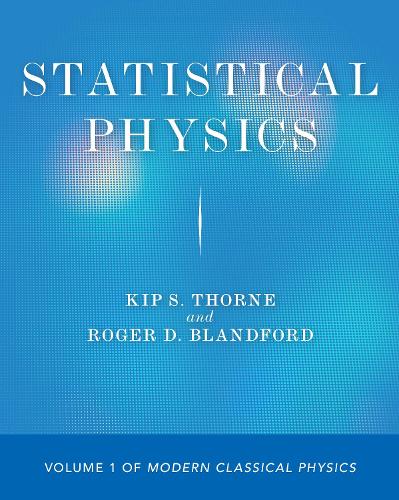
Statistical Physics: Volume 1 of Modern Classical Physics
(Paperback)
Publishing Details
Statistical Physics: Volume 1 of Modern Classical Physics
By (Author) Kip S. Thorne
By (author) Roger D. Blandford
Princeton University Press
Princeton University Press
24th August 2021
United States
Classifications
Tertiary Education
Non Fiction
530.1595
Physical Properties
Paperback
408
Width 203mm, Height 254mm
Description
A groundbreaking textbook on twenty-first-century statistical physics and its applications
Kip Thorne and Roger Blandford's monumentalModern Classical Physicsis now available in five stand-alone volumes that make ideal textbooks for individual graduate or advanced undergraduate courses on statistical physics; optics; elasticity and fluid dynamics; plasma physics; and relativity and cosmology. Each volume teaches the fundamental concepts, emphasises modern, real-world applications, and gives students a physical and intuitive understanding of the subject.
Statistical Physicsis an essential introduction that is different from others on the subject because of its unique approach, which is coordinate-independent and geometric; embraces and elucidates the close quantum-classical connection and the relativistic and Newtonian domains; and demonstrates the power of statistical techniques-particularly statistical mechanics-by presenting applications not only to the usual kinds of things, such as gases, liquids, solids, and magnetic materials, but also to a much wider range of phenomena, including black holes, the universe, information and communication, and signal processing amid noise.
- Includes many exercise problems
- Features colour figures, suggestions for further reading, extensive cross-references, and a detailed index
- Optional 'Track 2' sections make this an ideal book for a one-quarter, half-semester, or full-semester course
- An online illustration package is available to professors
Reviews
"Kip S. Thorne, Co-Winner of the 2017 Nobel Prize in Physics"
"Roger D. Blandford, Co-Winner of the 2016 Crafoord Prize in Astronomy and Winner of the 2020 Shaw Prize in Astronomy"
Author Bio
Kip S. Thorne, winner of the Nobel Prize in physics, is the Feynman Professor Emeritus of Theoretical Physics at Caltech. His books include Gravitation (Princeton) and Black Holes and Time Warps: Einsteins Outrageous Legacy. Roger D. Blandford, winner of the Crafoord and Shaw prizes in astronomy, is the Luke Blossom Professor in the School of Humanities and Sciences and founding director of the Kavli Institute for Particle Astrophysics and Cosmology at Stanford University.
